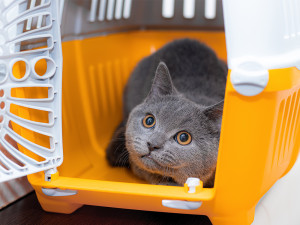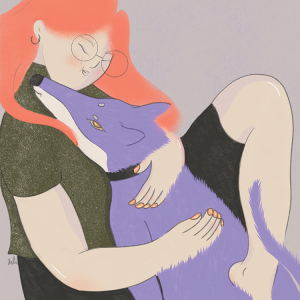It’s Hurricane Season—Can Your Pet Really Sense When a Storm Is Coming?
While you watch the forecast, we dig into whether this is a myth—or science.

Share Article
Maybe a grandparent or two has told you that it’s about to rain because their knee hurts. Well, our pets aren’t far off from acting like senior citizens whose predictions are more accurate than most meteorologists’. In fact, a lot of animals can sense a storm approaching because they have heightened senses. Birds, cats, dogs, and more have shown that they can sense when there’s a shift in the weather, and things are about to get intense.
Knowing when your pet is feeling a storm coming can not only help you prepare — but also get your pet ready to make sure they’re safe and comfortable.
Can pets sense when a hurricane is coming?
While there isn’t a lot of research on animals being able to detect changes in weather, the research continues to grow. A 2022 studyopens in new tab found that dogs’ and cats’ behavior (particularly related to their anxiety) is influenced by weather events, and research continues to advance when it comes to animals and their sense of weather changes.
They can smell it coming.
There isn’t a study that definitively proves that dogs can use their heightened sense of smell to predict a storm, but there are plenty of experts who believe that smell plays a part. If humans are able to smell incoming rain, it’s a pretty safe bet to assume that dogs and cats, both with heightened senses of smell than our own, can smell it coming too.

They’re sensitive to changes in barometric pressure.
Research continues to advance when it comes to animals and their sense of weather changes. A 2013 studyopens in new tab found that birds can sense a decline in barometric pressure and respond accordingly. Similarly, as the 2022 study indicated, dogs can also feel sudden drops in temperature and changes of temperature, indicating that a strong weather event, such as a hurricane or severe thunderstorm, is approaching.
“What we need advanced tools to predict, they’re able to use their senses to feel,” dog trainer Robert Haussmann explains. “So, while that sounds a little woo-woo, it’s just really about pressure.”
They can feel an increase in static electricity.
Imagine that every time a storm rolled through, your sweater suddenly took on a ton of static. Well, that’s essentially what can happen with some dogs.
“Some dogs are more sensitive depending on the coats that they have,” Robert adds. “If there’s an electrical storm, for instance, dogs who have a double coat can kind of build up some static in the electric storm.”
If your furry pup starts to seem a little more anxious before or during a storm, it could be because they’re feeling tiny shocks from all the insulated static electricity in their coat.
Signs and symptoms
Your pet’s reaction to a hurricane or incoming storm will depend on their own temperament. If you have a dog or cat who gets spooked by loud noises, they’ll most likely act afraid or nervous. If your pet doesn’t mind storms, they might show small changes in their behavior that are a little bit harder to detect
You might see changes in behavior.
Pets who are afraid of storms may start to show visible signs of stress and anxiety around an hour or so before the weather hits. They may start panting, pacing, or become extra clingy. Other changes in behavior may be more subtle, such as restlessness or acting just out of the ordinary, they may be responding to what they’re feeling from the weather. They may also show less interest in playing or physical activity.
Cats may become more reactive and fearful than usual, as well as show an increase in their vocalization.
Physical signs
If your dog starts to gravitate toward a place like the bathroom, laundry room, or another room with grounded pipes, that could signal that they’re feeling an uptick in electricity. Some dogs may also start shaking or showing signs that they want more attention from their parents.
Treatment and management
Making sure your pet feels extra comfortable before the storm hits may help ease their anxieties. Sit with them, act calm, put on a noise machine, or try anything else that you know will soothe them. Put extra effort in being in tune with your pet and don’t push anything. If you know your dog hates going out in the rain, for example, don’t make them do it unless there is no other option.
If your pet doesn’t respond to your efforts and still appears to be distressed during storms, try seeking out the help of a trainer.
“Trainers don’t just do ‘sit,’ ‘stay,’ ‘come,’ and ‘heal.’ They can actually give you some pretty insightful tips for desensitizing and counterconditioning a dog’s emotional state to any given situation,” Haussmann tells us. “And that could be storm phobia as well.”
When to see a vet
If you find your pet is consistently fearful and anxious to the point that it’s causing them debilitating stress or affecting their wellbeing, speak to your vet. They will be able to assess their symptoms and behavior to give you additional support tools. They will also be able to prescribe medication for anxiety or other symptoms that your pet struggles with.
FAQs (People also ask):
What should pet parents do to prepare for a hurricane?
For any major storm, people should have a preparedness plan — and that includes any supplies your pet may needopens in new tab. Have a bag set aside that holds anything your pet may need for an extended period of time: food and water, medication, toys, first aid kit, medical records, bowls, waste bags, etc.
References:

Erika Harwood
Erika Harwood is a writer and editor living in Los Angeles. You can find her work in Poosh, Byrdie, Nylon, and more. She also has a weekly newsletteropens in new tab you should subscribe to — but only if you want.
Related articles
![Woman plays with her dog on the beach in the summer.]()
9 Warm Weather Hazards for Dogs—And How to Keep Your Pup Safe All Summer
So you both can have the best time ever.
![a dog from Curb Your Enthusiasm wearing a coyote vest]()
Pay Attention to the “Curb Your Enthusiasm” PSA for Dog Coyote Vests
Clearly, Larry David wants your pup to be safe from coyotes. Here’s why you should, too.
Do Dogs and Cats Care What They Look Like?
They do seem to act different after a trip to the groomer, right?
![Woman sitting on couch with dog laying on lap watching TV]()
What Dogs See When They Watch TV
Is Animal Planet really their favorite channel?
![Illustration of a woman hugging a dog]()
Your Dog Can Smell When You’re Stressed, New Study Says
Research finds that your pup can smell when you’ve been doom-scrolling, and they get bummed out.
Do Dogs Understand Our Words?
Say What? A look at the types of words that dogs understand.









